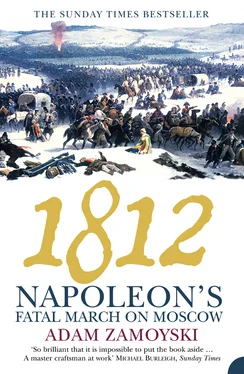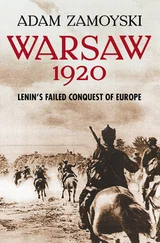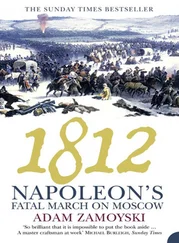But he was either being disingenuous or he was deluding himself, for the machinery of war had already clanged into gear, and its wheels were by now turning with such momentum that it would have taken a complete climbdown on the part of Napoleon or himself to stop them. Observing events from Vienna, Metternich was in no doubt that ‘the supreme struggle’ between the ancien régime and what he termed Napoleon’s revolutionary designs was now imminent. ‘Whether he triumphs or succumbs, in either case the situation in Europe will never be the same again,’ he wrote to his imperial master on 28 December 1811. ‘This terrible moment has unfortunately been brought on us by the unpardonable conduct of Russia.’ 3
‘I am far from having lost hope of a peaceful settlement,’ Napoleon wrote to his brother Jérôme on 27 January 1812. ‘But as they have adopted towards me the unfortunate procedure of negotiating at the head of a strong and numerous army, my honour demands that I too negotiate at the head of a strong and numerous army. I do not wish to open the hostilities, but I wish to put myself in a position to repulse them.’ 4He therefore needed to field an army vast enough to intimidate Alexander or, failing that, to force him into submission with a rapid and shattering blow. There was an element of haste involved, as he had to count with the possibility of a Russian first strike at any moment. Fortunately, he was not starting from scratch.
Following the treaty of Tilsit, a body of French troops remained in the Grand Duchy of Warsaw while the local forces were being organised, along with garrisons in key fortresses in Prussia such as Danzig, Glogau, Stettin and Küstrin. After the 1809 war with Austria, Napoleon left further garrisons at Düsseldorf, Hanau, Fulda, Hanover, Magdeburg, Bayreuth, Salzburg and Ratisbon. In May 1810 he strengthened all the forces on German soil and organised them into the Armée d’Allemagne, under Marshal Davout. In the autumn of 1810, following the Russian troop build-up along the border of the Grand Duchy of Warsaw, Napoleon reinforced this further. He also began moving units stationed in France closer to Germany, concentrating his artillery parks at Strasbourg, Metz, Wesel and La Fère, and withdrawing selected units from Spain.
In the spring of 1811, fearing a Russian invasion of the Grand Duchy of Warsaw, Napoleon ordered the Poles to mobilise 50,000 men. He had already ordered his stepson Prince Eugène de Beauharnais, Viceroy of Italy, to place the Army of Italy on a war footing. Now he instructed his brother Jérôme and other allied monarchs to mobilise the armies of Westphalia, Württemberg, Bavaria, Baden and the lesser German states. He meant to put together a force of half a million men with which to confront Russia. He began calling up men in France on a massive scale, and gendarmes combed the countryside for the tens of thousands of deserters who regularly sneaked away from the colours and went to ground. They would be rounded up and fed back into the army, along with the new recruits.
The French army was organised in divisions, which were usually made up of four regiments. A regiment of foot normally consisted of about 3800 men, with a hundred officers. It had up to five battalions, one of which was always at the depot, and these battalions consisted of six companies each, of which one would be a company of grenadiers, one of voltigeurs (skirmishers) and four of fusiliers. A company was supposed to number 140 men, including two drummer boys, and was commanded by one captain, one lieutenant, one sub-lieutenant, a sergeant major and a dozen other sergeants and corporals. To accommodate the new influx, Napoleon added a fifth and then a sixth battalion to existing regiments. The recruits were spread through the old battalions as well as the new ones, which were fortified with a sprinkling of veterans.
Napoleon attended personally to every detail. His correspondence in these matters reveals a staggering degree of familiarity with every brigade, regiment and battalion, where they were stationed, where they were due to move to, who commanded them, how many reinforcements they needed, where these could be drawn from, and how soon they could be made available. No detail was too insignificant for him. He attended to lettering on standards and badges, to the quality and calibre of arms and equipment, to numbers of horses and types of supply wagon required. To deal with the many rivers he would need to negotiate, he formed a bridging train equipped with pontoon boats and other necessaries at Danzig.
Curiously enough, the one thing he paid no attention to, now or at any stage in his military career, was the army’s basic weaponry. The artillery still used the Gribeauval gun and gun carriage, designed fifty years before, while the footsoldier’s weapon was a muzzle-loading flintlock musket of a design that had remained virtually unchanged for a hundred years. It was an extremely primitive instrument. To load it, a soldier would take a cartridge, consisting of a paper cylinder containing a measure of powder and a lead ball. He would bite off the end of the cartridge, keeping the ball in his mouth, sprinkle a little of the powder in the priming pan, and close the flap; he would then pour the remainder of the powder down the barrel, spit the ball in after it, screw up the paper into a wad, and ram the whole lot down to the bottom of the barrel with his ramrod. A trained soldier could reload and be ready to fire in one and a half minutes.
The musket was notoriously inaccurate even at short range and had a number of faults which could be dangerous. The black powder in the cartridges fouled the inside of the barrel, so that after a dozen or so shots it became increasingly difficult to ram anything down it, while the progress of the bullet being fired was also slowed. The powder in the pan might ignite, producing the usual plume of smoke, but the charge in the barrel might not go off – the proverbial ‘flash in the pan’. In the din of battle, the soldier might not register that his charge had not gone off, and set about loading up with another cartridge. If the first one then went off, the barrel was likely to explode in his face. But that was considered just another of the hazards of war. Footsoldiers were expendable, and there were always plenty more where they came from.
The relentless build-up of forces continued through the autumn and winter of 1811 and into the spring of 1812. The twenty-year-old son of a wine-grower in Burgundy presented himself at seven o’clock on the morning of 3 January 1812 at the Préfecture in Lyon, and a couple of days later he was in the barracks of the 17th Light Infantry at Strasbourg. ‘The very morning after our arrival, we were uniformed and armed, and, without giving us time to breathe, the corporals set about inculcating in us the principles of our new trade,’ he remembered. ‘They were in a hurry …’ 5
Raising the troops was only part of the task: the men had to be fed, clothed and armed. On campaign, the French soldier was supposed to receive a daily ration of: 550 grams of biscuit, either thirty grams of rice or sixty grams of dried vegetables, 240 grams of meat or two hundred grams of salt beef and lard, some salt, a quarter of a litre of wine, a sixth of a litre of brandy and, in hot weather, a shot of vinegar. By January 1812 Napoleon had amassed fifty-day supplies of biscuit, flour, salted meat and dried vegetables for 400,000 men and forage for 50,000 horses at Danzig. This was on top of the million rations stored at Stettin and Küstrin. 6
The enterprise also required the provision of hundreds of thousands of items of clothing, of boots of various kinds, and of small arms. It entailed the purchase of tens of thousands of horses for the cavalry, which had to be trained to carry a heavily armed rider and respond to his intentions as he wielded his sword, lance or carbine. They also had to be habituated to the roar of cannon and the clash of arms, by being led and then ridden, again and again, towards lines of men shouting, banging cooking pots and letting off guns in their direction, and to be rewarded each time with a carrot.
Читать дальше












